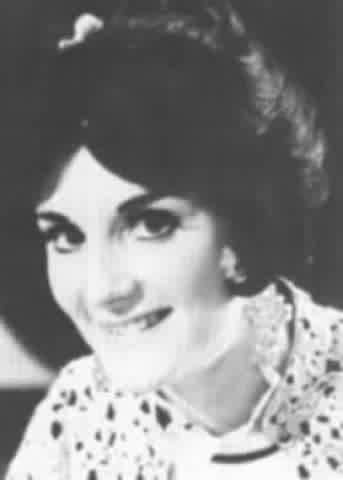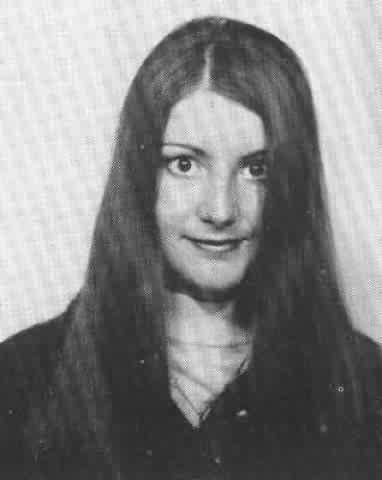|
|
|
 |
Few young ladies of a score or so summers can have achieved the same prominence in their chosen profession as Miss Lorraine Daniels. A youthful veteran, unscarred by success in an intensely competitive field, she found herself principal D'Oyly Carte mezzo soprano within four years of leaving college and happy to be in work
Lorraine's life seems to have been directed towards a single goal with all the purposefulness of predestination. Born in South Hornchurch in Essex, she began ballet, tap and acrobatic dancing when only three years old. Progressing smoothly through the examination grades until the age of twelve, she was unfortunately compelled to abandon serious aspirations in that direction by a severe ankle sprain.
Instrumental skills began with piano and recorder studies when Lorraine was seven. A year later she extended her interests to the violin, and in due course also became proficient on the clarinet and guitar. From earliest days it was evident that she had inherited her mother's vocal potential, and she displayed an immediate and instinctive affinity for the stage.
Regular dancing, participation in charity concerts, singing and acting in school plays, and membership of a church choir all contributed to an increasingly well-qualified experience. Performances followed in school productions of "Oklahoma!" and "West Side Story", and music lessons began to intrude on her lunch-hours while the piano dominated her leisure time.
In her mid-teens, she was fortunate to be introduced to Diane Napier-Tauber, widow of the celebrated Richard Tauber, the encounter influencing her to compete for the Richard Tauber Scholarship. Inevitably she was too young to succeed, but the attempt led to her being admitted to Trinity College of Music as a weekday junior pupil. She studied at the College under Sir Frederic Cox before beginning full-time studies there in 1972.
Electing to concentrate primarily on singing, with the piano as her second subject, she hoped to perform professionally after graduation: if this proved impossible, she would teach. The course included incursions into the history of music, preliminary encounters with opera, and mastering the intricacies of three foreign languages. Lorraine was awarded a diploma for harmony, won the Elizabeth Schumann Lieder Competition in 1974, and gained the LTCL for singing and ACTL for piano.
In January 1976 aged twenty-one she left Trinity College to join D'Oyly Carte as a chorister following the customary audition. The repertoire was entirely new to her, but she was familiar with Sullivan's music through his arrangements for piano. Like so many entrants to the Company before her, she learned the time-honoured stage movements from the indefatigable Mr. Marsland and appeared in her first opera "Patience" - within a fortnight.
"Where shall I begin with such a pile of scores and how shall I ever pronounce so many Gilbertian tongue-twisters?" she wondered Initial bewilderment gradually faded however as she learned how to tackle the work. Former training and earlier stage and dance experience paid rich dividends, and she soon started to come to terms with the complex requirements of the operas for singing, acting and movement. She could understand the orchestra's point of view too.
A sound technique enabled her to deal with the heavy vocal demands made upon her, but she quickly discovered that the combined pressures of regular touring, frequent rehearsals and daily performances called for unsuspected reserves of energy and stamina.
Within weeks of joining D'Oyly Carte she left on the 1976tour of the U.S.A., and in six months was understudying several small parts. In the following year she progressed to understudying the five major soubrette roles, and continued her swift advancement by promotion to full principal status when Jane Metcalfe left the Company in 1979. This was surely a classical example of being in the right place at the right time - and of being the right person!
Fans love to see former choristers taking the limelight, and Lorraine certainly found that she had benefited from her days in the chorus. They had given her useful insights into the style of the operas and the requirements of a specialised tradition. Like most professional Gilbert and Sullivan performers, she is convinced that the operas are not as easy to do well as is sometimes supposed.
Curiously enough it was dialogue which caused her most anxious moments, and audiences who admired the beautiful clarity of her diction will be surprised with what effort it was acquired. For the stage, she had to suppress a regional inflection, which happily she has retained in private life.
After taking over the roles, Lorraine developed her characterisation appreciably, and she generously pays tribute to the help of colleagues. Naturally she did not wish her portrayals to be replicas of those of her predecessors. She was the first to admit that she had much to learn, and looked forward to her performances maturing further as she became more relaxed and confident.
Emphatically she enjoyed the challenge of the operas and, except when severely overtired, found her work intensely stimulating. "Oh, not another Mikado!" she may think on her way to the theatre, but once she is made up and in costume the familiar tingle of excitement refuses to be repressed.
As Pitti-Sing she emerged bruised but happy from the rough-and-tumble of Act 2. Even a precarious crown cannot spoil lolanthe for her, and the extravagant role of Phoebe is among her favourites. Tessa, whose "When a merry maiden marries" lies with deceptive awkwardness for the mezzo, was perhaps her most tiring role - the gondoliers and their wives are seldom off-stage, have several costume changes, and do more than their share of dancing. Edith, mischievous and teasing, she found an agreeable extension of her own personality. "She has a dirty chuckle," said one knowledgeable commentator, "which is half the charm of Phoebe."
Not content with a wide diversity of characterisation, the Gilbert and Sullivan mezzo-soprano enjoys a correspondingly imposing vocal range from the low line of Pitti-Sing to the pre-eminence of Constance. Lorraine trained as a soprano, but informed opinion judged her a true mezzo. She had exactly the right vocal quality for her roles.
 |
Such spare time as she has is spent in cooking, knitting, embroidery, tapestry, macrame, swimming (she used to be a life-saver), and a little golf under the tutelage of the intrepid Miss Leonard.
She disliked the case-packing upheaval of perpetual touring and the frequently uncertain quality of the next digs. All the same she loves to travel and to see the sights. In this respect D'Oyly Carte was most obliging with a tour of Australia and two visits to the U.S.A. whilst with the Company. Among other exploits she managed to fly down the Grand Canyon and to greet relatives in Australia whom she had never previously met.
The D'Oyly Carte wardrobe was much admired by Lorraine, for it helped her to feel and act in character throughout. Beautifully and expensively made, the costumes were built to last and to survive an indefinite period of wear and tear. In consequence many were heavy and could be hot to wear on-stage.
Lorraine had a new Pitti-Sing outfit, but the venerable age of many of the costumes testified to the success of the formula. Clearly the services of a dresser were essential to cope with buttoned boots, spreading skirts, and a host of accessories when speed was often imperative. And how did Lorraine coax her long tresses inside a tightly-fitting wig?
The impressive fairy costumes for the production of "Iolanthe" were externally rather prickly - "Hug a fairy and be cut to pieces," ruefully remarked one ex-member of the Company! In the course of hasty dressing-room departures, it had been known for the fairies to transport a quantity of assorted unmentionables on-stage, inextricably impaled amid the glitter!
It is of course no secret that D'Oyly Carte was exclusively populated by delightful people, but even in such amiable company Lorraine was conspicuous. As agreeable and attractive a young lady as one can reasonably hope to meet, she won affection as much by her indiscretions as by her considerable accomplishments.
| Artist Index | Main Index |